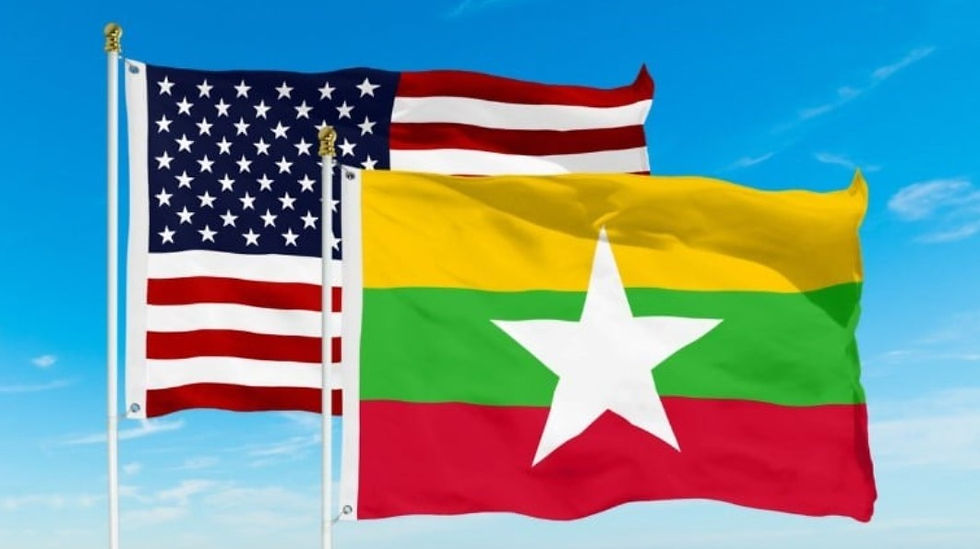The “Asks” for a New US Burma Policy: How the US Could Help End the War Without Firing a Shot
- Saw Kyaw Oo
- Nov 17
- 4 min read
Antonio Graceffo
Recent actions by US President Donald Trump’s administration suggest a new Burma policy may be emerging, one that could benefit the pro-democracy forces. Targeted sanctions against junta-aligned groups like the DKBA and BGF, the creation of the Scam Center Strike Force, and the careful handling of the Starlink investigation all show a growing U.S. willingness to distinguish between junta proxies and resistance EAOs. These steps indicate Washington may be moving toward an approach that recognizes and supports Burma’s pro-democracy movement.
Burma still has several allies in Congress who helped shape earlier policy and have urged the administration to develop a coherent strategy. In the House, Rep.
Bill Huizenga and Rep. Betty McCollum co-chair the bipartisan Congressional Burma Caucus, founded in February 2024. Rep. Huizenga introduced the BRAVE Burma Act in 2025 with McCollum, Rep. Ann Wagner, and Rep. Seth Moulton, while Rep. Gregory Meeks, as chair of the House Foreign Affairs Committee, was the original sponsor of the BURMA Act. In the Senate, long-time supporters include Senators Ben Cardin, Jeff Merkley, Richard Durbin, Ed Markey, Todd Young, and Susan Collins, with additional support from Senate Minority Leader Mitch McConnell and Senator Jim Risch.
The BRAVE Burma Act would extend the BURMA Act’s sunset period from eight to ten years, require annual sanctions reviews on Myanmar Oil and Gas Enterprise, Myanma Economic Bank, and foreign persons operating in the jet fuel sector, create a U.S. Special Envoy for Burma with ambassadorial rank to coordinate policy, and limit IMF shareholding increases for Burma while the State Administration Council remains in power.
The bill has passed only one of three required House committees. It has not passed the full House, has not been introduced or considered in the Senate, and has not been signed by President Trump. It remains in the early stages of the legislative process with a long path ahead before it can become law.
Existing U.S. Burma policy is anchored in the FY2023 National Defense Authorization Act, which incorporated provisions from the BURMA Act. The law states that it is U.S. policy to support the Burmese people in their struggle for democracy, freedom, human rights, and justice. It authorizes additional sanctions and non-lethal technical assistance for Ethnic Armed Organizations, People’s Defense Forces, and pro-democracy groups, while explicitly barring any assistance to the State Administrative Council (now the National Security and Peace Commission), the Burmese military, or entities under their control. The non-lethal assistance authorization potentially covers uniforms, protective gear, armored vehicles, radar systems, and medical supplies.
In July 2024, in a bipartisan letter, Senators Risch, Cardin, McConnell, Merkley, and Young pressed the State Department and USAID to adopt a more proactive Burma policy, warning against ceding U.S. leadership as the war rapidly evolves.
They urged a forward-leaning strategy that provides resistance groups with the non-lethal equipment they need, including medical gear, body armor, early warning radar, and drone jammers to defend against junta attacks.
Over the past ten months, this author has contributed to the drafting of several reports requested by the U.S. Department of State and the White House, explaining the situation in Burma and offering recommendations for U.S. policy.
Recent statements have outlined the benefits that a stable, peaceful, and democratic Burma would bring to the United States, the region, and the world.
Experts and individuals tracking the Burma war have consistently emphasized that supporting Burma is in America’s national interest. “A democratic Burma is good for the world,” said David Eubank, head of the Free Burma Rangers, a frontline aid organization operating in Burma since the 1990s.
A democratic Burma would reduce China’s influence in the region, block the Chinese Communist Party from securing strategic access to the Bay of Bengal through the China–Myanmar Economic Corridor, and end the refugee crises affecting Thailand, Bangladesh, India, Malaysia, and other neighboring countries.
It would also allow a democratically elected Burmese government to work with the United States and Interpol on major crime issues such as transnational drug trafficking, human trafficking, and the elimination of Southeast Asia’s scam centers.
For the United States, an added benefit would be access to Burma’s rare earth deposits, which President Trump has already expressed interest in sourcing from Kachin State. Expanding these supplies would strengthen U.S. national security by reducing dependence on China for critical materials.
Papers, testimonies, and articles presented to the U.S. government have outlined several key asks that would improve life in Burma and help end the war. First, Washington should engage directly with the Ethnic Armed Organizations and their civilian administrations, bypassing the junta.
Second, the United States should provide aid through ethnic networks to support the internally displaced people, a step fully permissible under existing U.S. law.
Iraqi Kurdistan offers a successful model, as the United States supported an autonomous region inside a foreign country that now has its own government, military, and visa system, and has become one of the safest and most prosperous areas in its region. The United States could do the same for Burma’s ethnic states, where peace and economic stability would allow these areas to rebuild civilian institutions and trade with each other, the United States, and regional partners without requiring a major increase in American foreign aid.





Comments